Compared to losing weight, staying the same weight sounds like it should be easy.
“Just don’t go back to what you were doing before!”
Simple, right?
Yet it often doesn’t feel that way.
In fact, maintaining your progress might be even harder than dropping those pounds in the first place.1
This is true even if you don’t crash diet.
That’s because…
What makes you good at losing weight doesn’t necessarily make you good at keeping it off.
Post-weight loss, people often find themselves wondering:
- ‘Can I really keep saying “no” to ice cream forever?’
- ‘What’s my goal now that… I don’t have a goal?’
- ‘If I’m not trying to lose weight, but I can’t go back to my old habits, what am I supposed to do?’
Here’s the good news:
If you’ve lost weight, you do have the skills you need to maintain your weight.
But those skills likely need to evolve. This guide will show you how.
+++
Reaching your weight loss goal means you’ve mastered a set of skills.
That’s right, “skills.” Essentially, you’ve built a better health resume of consistent practices and experience.
For example, you’ve likely learned how to:
- Maintain your boundaries and avoid foods and situations that don’t align with your goals
- Create new nutrition, exercise, and/or lifestyle habits
- Stay with the discomfort of doing things differently
- Consistently stick to your plan (whether it’s restrictive, super flexible, or somewhere in between)
Congratulations!
This deserves some recognition.
In a world filled with hyperpalatable foods, out-of-control stress levels, and unlimited access to screens, changing your body and improving your fitness and health isn’t easy.
But once you’ve reached your goal, the game changes.
You may feel like you don’t know HOW to maintain your new progress.
Maybe you don’t know how to live your life without “being on a diet.” (Or you may have to face whatever “being on a diet” helped you avoid in your life.)
You may feel afraid that you’ll have to:
- follow a rigid meal plan
- track every morsel of food
- weigh yourself every day; and
- constantly worry about your weight
… FOREVER AND EVER AND EVER.
Ugh. Why bother?!
The good news is: Weight maintenance is a different game than weight loss. And you can learn to play that new game, just like you can learn anything else.
Weight maintenance means adjusting your mindset—and your hard-earned skills—accordingly.
Ever rewrite your resume for a new job? Your skills don’t actually change, but how you express those skills does.
And, of course, once you start, there’s a learning curve—no matter how experienced you are.
It’s the same when you enter a new phase of weight control. But by adjusting your skills, and then practicing them, you’ll be up to speed in no time.
3 ways to evolve your skills for weight maintenance
| Weight loss skill | Why it works for weight loss | Why it doesn’t work for maintenance | Weight maintenance skill |
|---|---|---|---|
| Learning how to say “no” and setting boundaries | Helps you avoid overeating triggers and preserve your time/energy | Saying “no” all the time can become too restrictive | Master moderation: Balancing your “yeses” and “nos” |
| Creating and maintaining new habits | Moves the needle on weight loss; feels exciting and fresh | You know what to do, but it’s no longer novel or fun | Evolve your habits using the “dial method” and our deep health framework |
| Working towards a specific goal | Your source of motivation is obvious | Motivation becomes less tangible when pursuing the status quo | Find your deep reason, and regularly connect to it |
Skill #1: Shift from a place of “no” to “sometimes yes.”
Saying no to every unplanned treat? Sure, you can do it for a short period of time. In the long-term, though, saying “no” too often feeds into something we refer to as the challenge cycle (a.k.a. yo-yo dieting), as you can see in the illustration below.
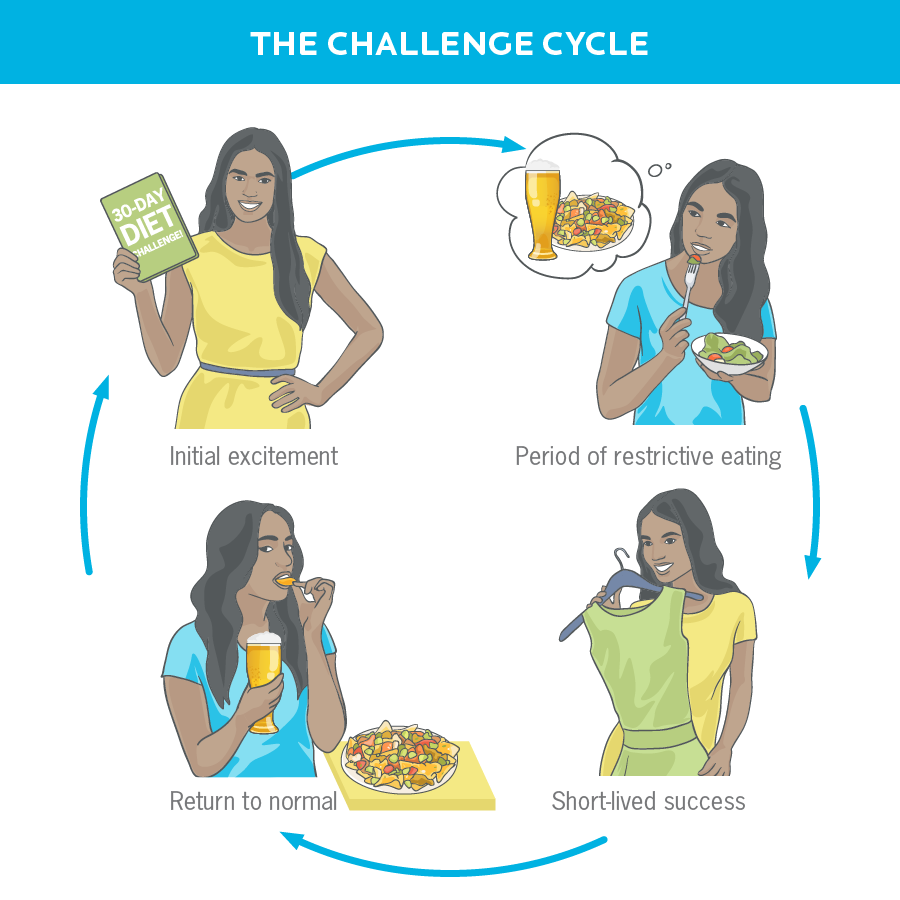
This frustrating experience is pretty familiar to most of us.—even for those who’ve lost weight sustainably. (You have to change or restrict your diet in some way to lose weight.)
So how do you break the cycle without regaining the weight? Practice saying “yes” sometimes, but not always.
You’ll probably recognize this as practicing moderation, which can be confusing and hard (and maybe scary).
But we’re about to show you how to ease your way into it. So that it feels totally doable (and not so scary).
Try it: What happens when you say “yes”?
This is a pretty straightforward process of trial and error. Fair warning: It might be uncomfortable at times.
Step one: Say “yes” when you’d normally say “no” because of your weight loss habits.
For example, maybe you say “yes” to:
- Eating birthday cake
- Skipping the gym to do something that sounds more fun
- Having two glasses of wine with dinner
- Staying out late with your friends
Do any of this too often, and you’ll likely end up regaining the weight you lost.
But these are also the types of experiences that bring color to your life. Avoid them completely, and you may feel like you’re missing out. (And end up sliding into the challenge cycle).
So experiment with saying yes. Each time, write down what happens, including:
- How did you feel?
- Would you do it again? Why or why not?
- What did you learn?
Follow this practice for a couple of weeks. Eventually, you won’t need to write down your reflections anymore.
Each time you say “yes” to something, you’ll get a better feel for what’s worth it—and what’s not.
Over time, it’ll become a new skill that helps you better balance “yeses” and “nos.”
Skill #2: Reframe your habits.
By the time many people reach their weight loss goal, they find themselves getting restless.
They know how to stick to their food and exercise habits, but it’s just not exciting, challenging, or interesting anymore.
The result: They start to let their healthy habits slide.
Here’s where a little reframing can make a world of difference.
Try it: Use the dial method and deep health framework.
Here at PN, we use these two strategies to help people reevaluate their habits and decide how they might move forward.
You could use one or the other, or both, to figure out what your “next level” or next challenge might look like.
The dial method
All of those habits that helped you reach your weight loss goal? They can be “dialed” up or down, depending on what’s going on in your life.
For instance, maybe your weight loss workout routine looked like number six on the exercise dial below: three one-hour gym workouts per week, plus a daily walk.
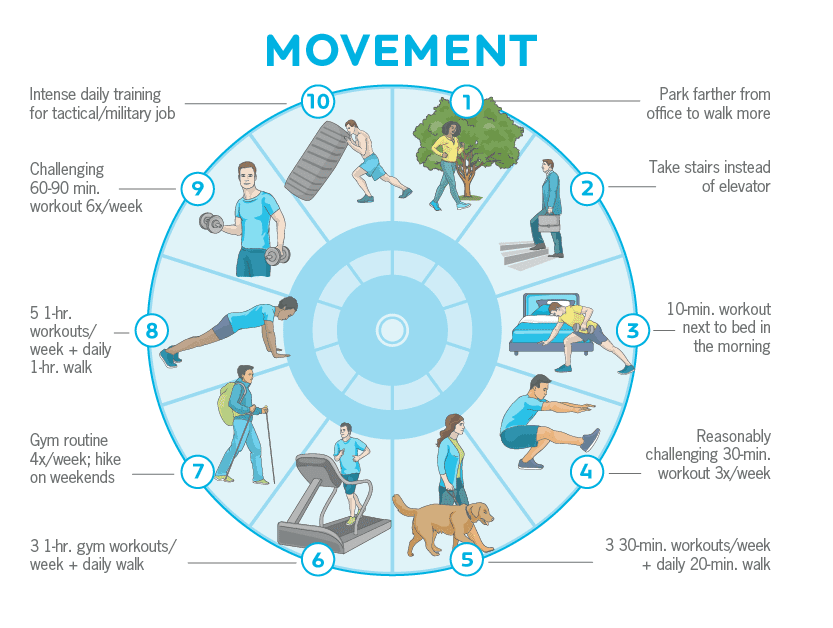
But perhaps in order to accommodate this, you had to dial down in other areas of your life, like socializing, de-stressing routines, or maybe even sleep.
One way to make healthy living feel more exciting now that weight loss isn’t your number one priority:
Play with the dials.
Maybe you can dial down your nutrition habits slightly, while dialing up your sleep habits.
That might look like meal prepping for just three days a week instead of seven. Now, you have more time to experiment with a restorative yoga routine before bed and waking up with the sun.
That’s just one example of the virtually unlimited options. For more ideas on how to put this into practice, check out our infographic that shows you how to adjust your “life dials.”
The deep health framework
Health is about the physical elements of your life, but it’s also about how you think, feel, live, and connect to others.
That’s one of the reasons we coach with the goal of deep health.
There are six areas or domains of deep health: physical, emotional, environmental, mental, existential, and relational.
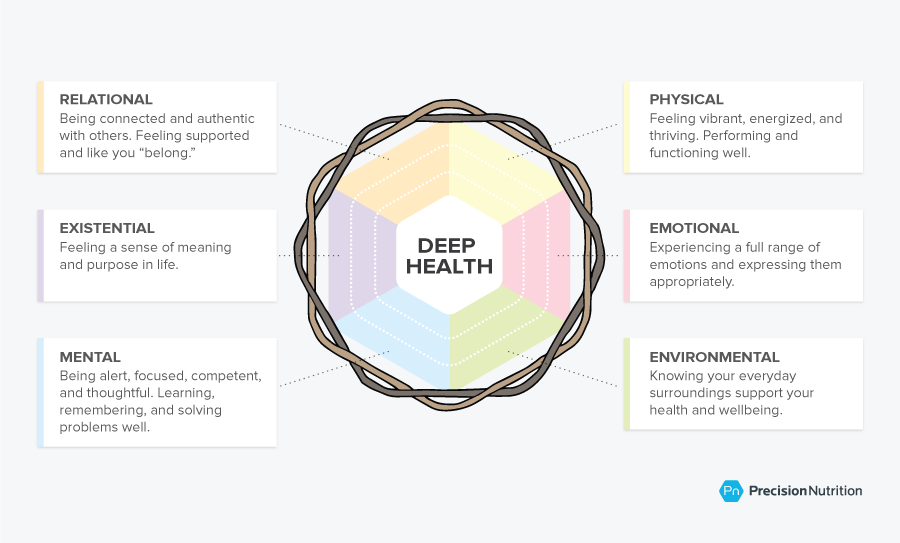
Your weight and body composition fall under the “physical” domain.
But there are five other domains where you can make progress. If you’re looking for a new challenge, this could be it. Simply identify one domain you want to work on and create some new practices there.
If you’re not sure where to start, fill out this deep health questionnaire and do a little self-reflection.
Where does it seem like there’s room for improvement? Where would you most like to grow or do better?
Here’s the coolest part about deep health: Progress in one domain can help improve the others. Sometimes, in ways that make maintaining your weight easier.
For instance, maybe you work on your mental health by finally going to therapy. That might result in reducing urges to binge eat.
Another example: Working out the lingering issues with your mom might mean fewer sleepless nights, giving you more energy to exercise.
It’s all interconnected, and that’s a beautiful thing. Why not take advantage of it and refresh your habits in the process?
The bottom line: Expand your view of health beyond what’s going on with your weight.
There’s nothing wrong with caring about your weight and body composition. But by the time you make it to maintenance mode, you’re ready for the next level.
Skill #3: Use your deep reason for motivation.
Pursuing the status quo can feel… anticlimactic.
On New Year’s Day, most people don’t say, “Hey, I think I’ll shoot for no improvement in my life this year!”
That’s how maintenance can feel, especially if you’ve made tremendous progress with weight loss.
The result: People who’ve gotten used to having a clear goal in sight might feel lost, confused, or even a little discouraged.
Whether we’re talking about food choices or workout habits, reminding yourself that your goal is to stay exactly the same isn’t very motivating.
Try it: Connect to your deep reason.
There’s one motivational strategy in particular that can help you keep going when you don’t have a big, shiny, exciting goal.
Identify your deep reason for wanting to maintain your weight—or even just live a healthy lifestyle—and remind yourself of it frequently.
We use The 5 Whys exercise to help clients identify their meaning and purpose.
The 5 Whys starts with a simple question: “Why do I want to accomplish this?”
In this case, you might start more specifically with: “Why do I want to maintain my weight?”
Then, whatever answer you come up with, ask why again. And so on, five times, until you get to the heart of what’s really behind your goal.
You can use this worksheet to get started.
What might your “why” look like? Examples:
- To be fit and mobile enough play with your kids and grandkids (because that time is precious for all of you)
- To be able to go on adventures with your partner (because these experiences strengthen your bond)
- To enjoy a high quality of life for as long as you can (because you saw how poor health affected a family member)
Here’s what’s really cool:
Your meaning and purpose can replace weight loss and become your new big shiny goal.
Now you have a clear reason to do the hard stuff when it comes to living a healthy lifestyle.
Connecting to this deeper meaning and purpose also helps you avoid getting caught up in day-to-day struggles, like the ups and downs in your scale weight.
You’ll always have a gut check available to help you to decide whether you’re on the right track.
You can ask:
‘Is what I’m doing right now aligning with my purpose?’
And if not… ‘Am I okay with that?’
If you’re not okay with it, you’ve got a pretty compelling reason to circle back on your habits (using the process outlined in skill #2) and adjust as needed.
Together, these 3 skills help you build self-trust.
Developing trust in yourself is a life-long pursuit. It takes some time to develop, and no single experiment or practice can necessarily “get you there.”
Self-trust is the ultimate weight maintenance skill.
In some ways, it’s the ultimate life skill.
But for life-long weight maintenance (and life-long health management), you’ve got to make the transition from having a regimented plan to facing an uncertain future without one.
That requires something big: being more flexible in your thinking and trusting yourself to course correct as needed.
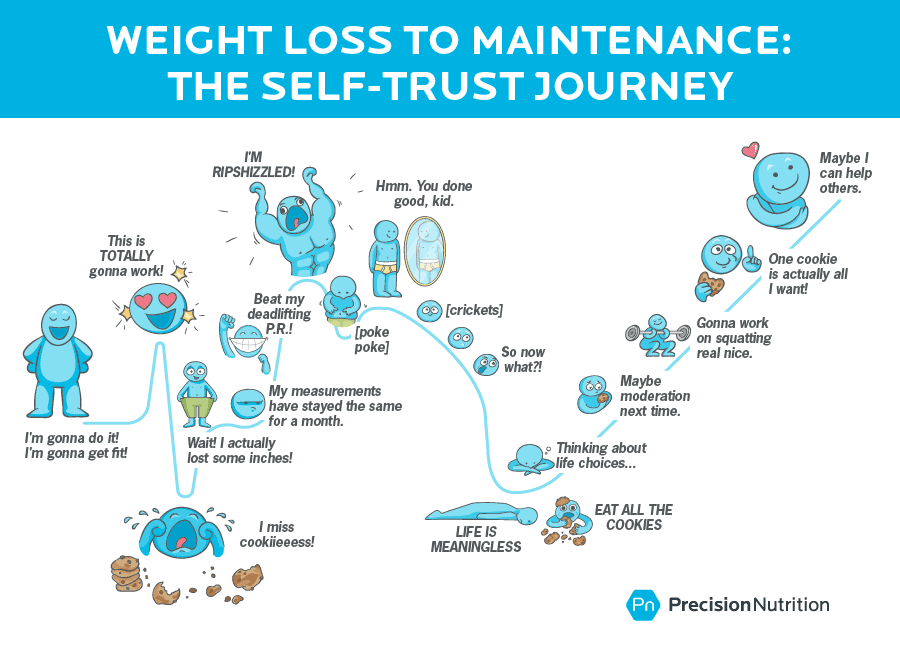
You can probably see how practicing the three skills outlined in this article set you up to develop self-trust:
- Skill #1 helps you get to know what works for you and what doesn’t. It enables you to develop healthy but flexible boundaries.
- Skill #2 allows you to learn why, how, and when to tweak or evolve your health habits to fit your current needs and goals.
- Skill #3 keeps you constantly grounded in the reason behind it all—your “why” for even caring about this stuff in the first place.
Combined, these three skills enable you to tackle whatever comes your way.
And as a bonus, you’ll develop an ability to sense your ever-changing needs. Better yet, you’ll be able to do something about them.
References
Click here to view the information sources referenced in this article.
If you’re a coach, or you want to be…
You can help people build sustainable nutrition and lifestyle habits that will significantly improve their physical and mental health—while you make a great living doing what you love. We'll show you how.
If you’d like to learn more, consider the PN Level 1 Nutrition Coaching Certification. (You can enroll now at a big discount.)



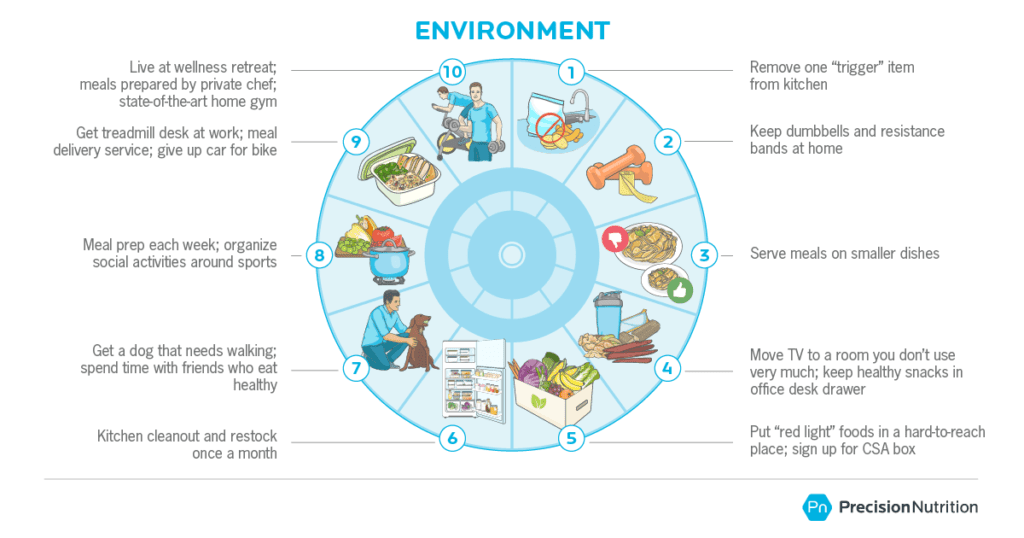
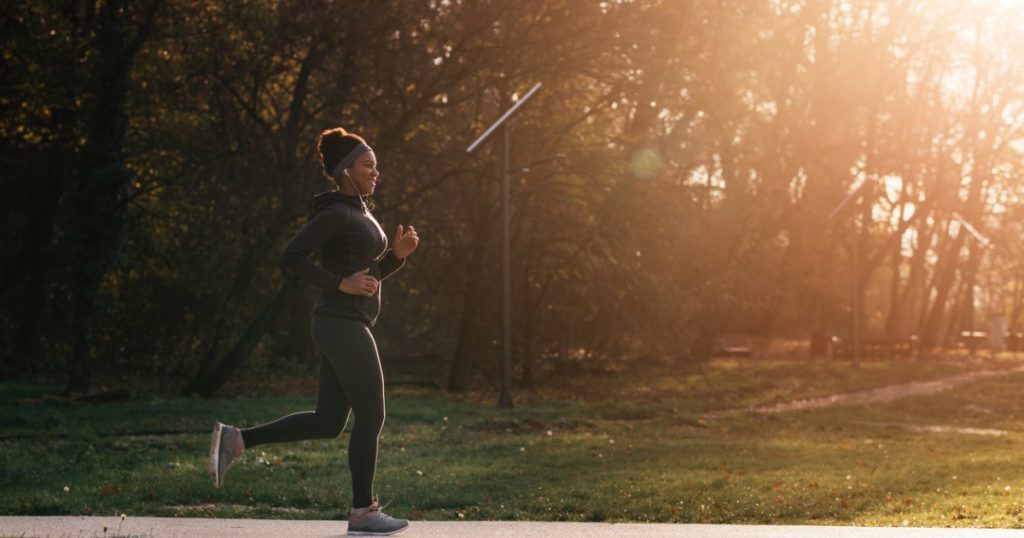
Share